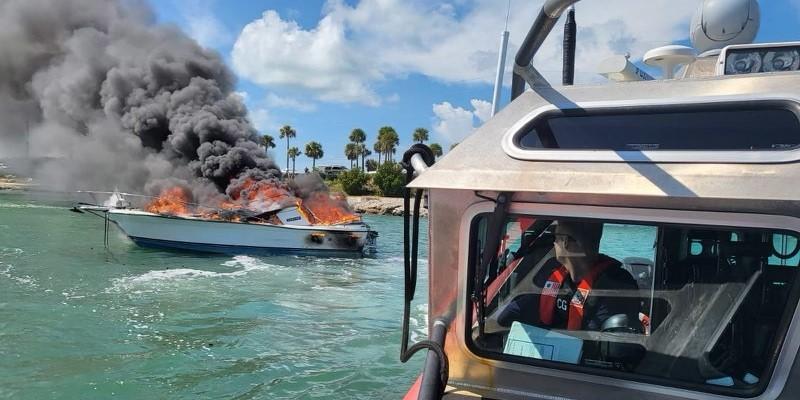U.S. Coast Guard Undertakes Key Data Network Improvements
The U.S. Coast Guard will consolidate its disparate data communications networks onto a single modernized data communications platform through a new $161 million contract with AT&T. The telecommunications carrier will provide the Coast Guard with advanced global data telecommunications services to improve the sea service’s network efficiencies, speed and flexibility, the company reported. In addition, the effort will expand the sea service’s use of FirstNet, the public safety communications network provided by AT&T.
Under the 11-year contract with options, AT&T will move the U.S. Coast Guard from its legacy telecommunications to a new, IP-based communications infrastructure. The telecommunications company will also deliver commercial satellite backup communications services to the AT&T wireline capabilities for the Coast Guard’s Rescue 21 sites. AT&T will manage the satellite services for the guard, including service planning engineering, provisioning, implementation, end-to-end service management and service assurance with a service level agreement, according to the company.
The stakeholders have already started the network planning process, AT&T indicated.
The sea service, which also is adding new capabilities to conduct offensive cyber while improving the performance of its existing defensive cyber operations, is embarking on a comprehensive network modernization effort, said Rear Adm. David Dermanelian, USCG, assistant commandant for Command, Control, Communications, Computers & Information Technology (C4IT). This latest contract with the telecommunications carrier will boost Coast Guard communications across its global locations in support of the modernization.
“The Coast Guard is looking forward to leveraging modern networking capabilities through DITCO [Defense Information Technology Contracting Organization] and prime contractors to service over 800 sites where we operate,” the admiral told SIGNAL. “AT&T has been a trusted partner providing FirstNet public safety broadband communications services. That’s why I am confident in their ability to assist our network modernization journey, one of five Coast Guard Tech Revolution lines of effort.”
The Coast Guard’s so-called Tech Revolution five lines of effort, announced last February by the service’s commandant, Adm. Karl Schultz, include the pursuit of communications and IT infrastructure modernization; improvements to ship and cutter connectivity; expansion of cyber capabilities; software, cloud and mobile application improvements, and increased data management to aid decision-making. These steps are meant to support the Coast Guard in conducting its unique federal responsibilities of search and rescue; maritime law enforcement; navigational aid; ice breaking; environmental protection and pollution response; port, river and waterway security; and military readiness.
The U.S. Coast Guard @USCG, under a new $161 million contract with @ATT, will move its legacy data communications networks onto a single modernized data communications platform, to better supports its unique and demanding missions #CoastGuard pic.twitter.com/Q3dr2LAoOY
— Kimberly Underwood (@Kunderwood_SGNL) December 8, 2021
“Time is precious for the critical services the U.S. Coast Guard provides, from search and rescue to port security and military readiness, said Stacy Schwartz, vice president of AT&T’s FirstNet Program. “It’s vitally important they have a fast, reliable and modernized data network to help ensure rapid flow of data to support their important work daily. We’re proud to help the Coast Guard deliver its mission with our fast and highly reliable network platform and advanced technologies.”
The Defense Information Systems Agency made the solicitation decision through DITCO, its contracting arm, as part of the General Service Administration’s Enterprise Infrastructure Solutions (EIS) contract. The new award will allow “for a more direct relationship between the Coast Guard and AT&T, via the DITCO, since the Coast Guard network is part of the Department of Defense Information Network (DODIN),” AT&T stated.
In addition, the contract will support user connectivity, communications and operational requirements for the DODIN, Sensitive But Unclassified (SBU) Voice, an Internet Protocol-based (IP-based) wide area network, authorized intranets, appropriate extranets, virtual private networking, private line, fixed wireless, optical wavelength, commercial satellite communications and other operations.
“We will supply the U.S. Coast Guard an IP-based, fast, flexible and reliable data network to support a variety of connectivity, communications, and operation requirements,” Schwartz indicated.
In addition, the contract award paves the way for the sea service to expand its usage of FirstNet, the dedicated, nationwide communications public safety platform built with AT&T. As a subscriber to FirstNet, the Coast Guard uses FirstNet services and capabilities for routine and special operations. As of October 2020, the sea service had equipped more than 1,300 pilots and aircrew across their various aircraft platforms with FirstNet-enabled tablets for pre-flight planning and awareness purposes, the company said.
“Now, the U.S. Coast Guard has a prime contract with AT&T for both wireline and wireless, including FirstNet services,” she said. “This makes it more efficient for the Coast Guard to expand its use of FirstNet services, service plans and devices. The agreement also allows the Coast Guard to use FirstNet for primary or back-up data connections to USCG fixed facilities, including the Rescue 21 sites.”
Coast Guard officials also use the public safety network to securely distribute mission-critical guidance, references and policies in support of operational efficiency and safety during day-to- day operations as well as large-scale disaster responses. The sea service has already relied on FirstNet during incidents, including search and rescue cases, and national events, such as the Super Bowl and Fleet Week.
“Coast Guard cutters and other boats can connect to the Coast Guard Wide Area Network provided by AT&T while in port,” Schwartz explained. “Network connectivity for the Coast Guard’s FirstNet-enabled mobile devices will be available to those users a few miles from the coastline, depending on the location of fixed, land-based equipment. AT&T provides the FirstNet services under a North American usage plan, which means that no roaming charges will apply for mobile network connections derived from Canadian or Mexican radio access networks.”



Comments